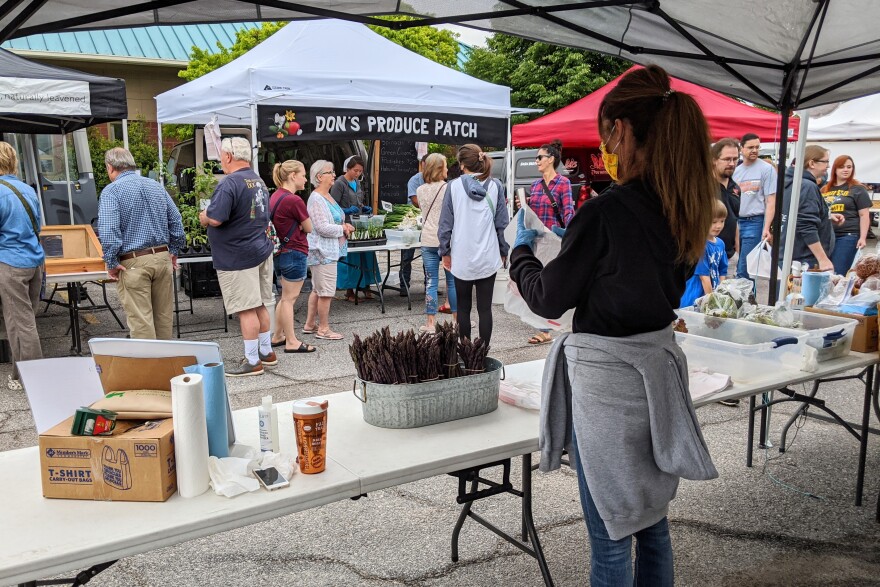WICHITA, Kansas — For the last two months, employees at Walnut Valley Packing in El Dorado have been working extra hours, even Saturdays, to cut, grind and package meat so it can keep up with a sudden spike in demand.
“I think the first time in March when somebody walked into Walmart or Dillon’s and saw that there’s no meat, I think people kind of freaked out,” said Matt Carselowey, Walnut Valley Packing’s plant manager.
The lack of meat in grocery store chains is due in part to coronavirus-related slowdowns and closures of meatpacking plants around the country. But those supply chain difficulties are creating an opportunity for local food producers — from cattle to cabbage.
Before the pandemic, Walnut Valley was preparing to open up a second storefront in a nearby town. Carselowey said he had an entire store’s worth of inventory in the freezer, ready to be sold.
It was barely enough to meet demand. The small, family-owned beef, pork and game processor quickly sold out of everything.
“We’ve had a lot of new customers come through the door that might not have came in otherwise,” he said.

Many were just people trying to find meat anywhere they could. But for Carselowey, it was also an opportunity.
“I think this has kind of opened a lot more people’s eyes to ‘Where is my meat coming from,’” he said, adding that people might be realizing too that “small processors … can offer a different product or … unique products.”
Walnut Valley also processes meat for local cattle ranchers, who sell it under their own private label (it’s called direct marketing).
Normally, those ranchers can get meat processed in about a month. But now is far from normal, and Walnut Valley’s first open slot is May 2021.
“We are really struggling to meet demand for our product,” said Linda Pechin-Long, co-owner of Graze The Prairie cattle ranch in the Flint Hills. “Which is a good problem to have, I guess.”
Pechin-Long and her husband sell their meat online and at a few local farmers markets. But like many direct market ranchers, they’re struggling to get a spot at any of the few dozen local processors left in Kansas.
“Right now, we’re looking at not having summer sausage for Christmas because we usually schedule that for processing in October, and they are booked through January or February of next year,” she said.

The farmers market rush
The coronavirus also appears to be pushing people to tap into other local producers — at least more than they normally would. That includes farmers markets.
“Over the past three weeks, I’ve had consistent crowds showing up,” said Luke Snow, president of the Old Town Farm and Art Market in Wichita. “Everyone’s I think just happy to get out in the fresh air and sunshine and do some shopping.”
He said while the pure number of people attending is a little lower than normal, sales have been through the roof. It’s the selling points of local food — knowing where it comes from, if chemicals were applied and who has handled it — that he thinks are more appealing than ever.

At the Kansas Grown Farmers Market across town, Jill Stimatze with Natural to the Corr said they’ve also seen lots of new customers this spring. She said she thinks one reason is because people feel safer at the market.
“I feel like it’s because it’s in the open and actually people are not touching everything like they would in a grocery store,” she said.
A few booths away, Arno Miller of Miller’s Homestyle Meals told a similar story. He and his wife ramped up home-delivery service as the impacts of the coronavirus began to set in. In early May, they set a sales record.
“I have no idea whether it will be a long-term benefit or not,” he said. “But for the time being, we’re happy to serve.”
Brian Grimmett reports on the environment, energy and natural resources for KMUW in Wichita and the Kansas News Service. You can follow him on Twitter @briangrimmett or email him at grimmett (at) kmuw (dot) org. The Kansas News Service is a collaboration of KCUR, Kansas Public Radio, KMUW and High Plains Public Radio focused on health, the social determinants of health and their connection to public policy.
Kansas News Service stories and photos may be republished by news media at no cost with proper attribution and a link to ksnewsservice.org.





